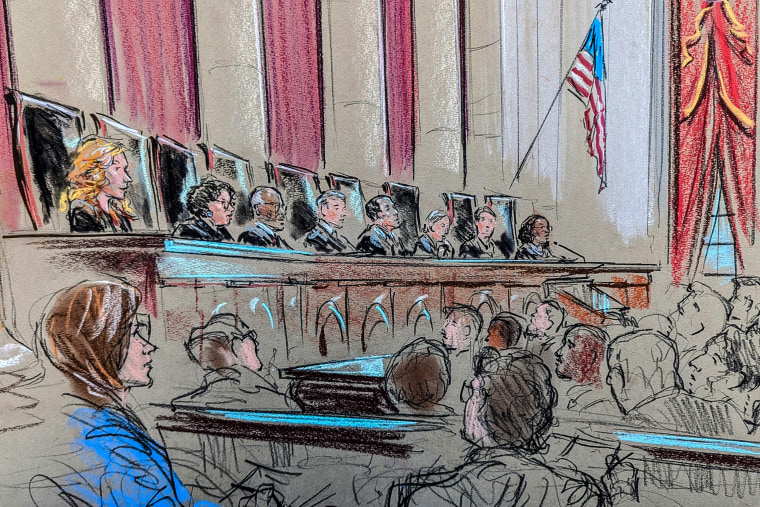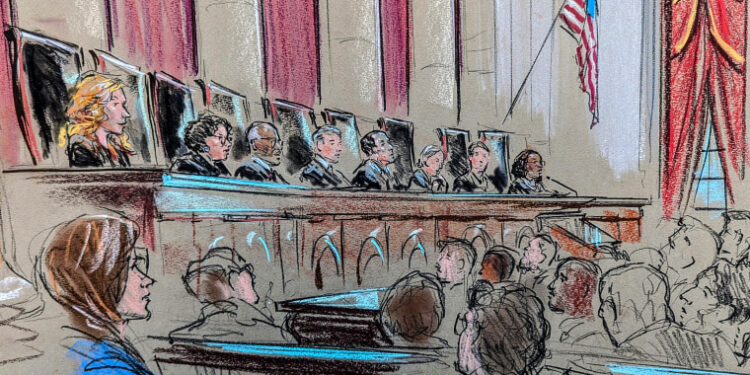The Supreme Court’s presidential immunity decision Monday is expected to add new twists to Fulton County, Georgia, District Attorney Fani Willis’ already stalled racketeering case against former President Donald Trump and his allies.
The Georgia case, which involves some of the same issues in special counsel Jack Smith’s prosecution of Trump on federal election interference charges, was officially paused last month until at least October, when an appeals court will hear arguments from Trump and some of his co-defendants challenging the presiding judge’s decision not to disqualify Willis as prosecutor.
Superior Court Judge Scott McAfee has yet to set a trial date, and one of the motions pending before him is Trump’s bid to get the charges tossed out on presidential immunity grounds.
The Supreme Court ruled largely in Trump’s favor on that issue in the federal case Monday, finding that he has immunity for some of his conduct in office and may have immunity for other actions, as well.

Willis’ office declined to comment on the ruling. Trump attorney Steve Sadow referred a request for comment to Trump’s campaign, which did not immediately respond.
NBC News legal analyst Barbara McQuade, a former U.S. attorney, said the Georgia case “is now subject to the same scrutiny as the federal case.”
“Trump will move to dismiss the case on the grounds of immunity, and a hearing will be required to determine what is official versus unofficial conduct in the indictment,” she said in an email.
The high court’s 6-3 ruling said that Trump’s contacts with Justice Department officials about his stolen election claims are protected by immunity and that he is also “presumptively immune” from being prosecuted for his contacts with then-Vice President Mike Pence in the weeks leading up to the Jan. 6, 2021, riot at the Capitol. Those contacts are also cited in the Georgia case.
The ruling did not decide on the issue of immunity in connection with Trump’s contacts with people outside the federal government, including Georgia Secretary of State Brad Raffensperger. Trump’s Jan. 2, 2021, phone call urging Raffensperger to “find” more votes than Joe Biden had in the state is a key component of the Fulton County indictment, as is the effort to enlist so-called alternate presidential electors for Trump.
The Supreme Court decision said in the federal case that determining whether such actions were official acts or not “requires a close analysis” by the judge, including “an assessment of numerous alleged interactions with a wide variety of state officials and private persons.”
Allegra Lawrence-Hardy, an Atlanta attorney, said that when the official pause in the Fulton County case is eventually lifted, there would then be additional litigation over whether certain acts by Trump were official or not, leading to further appeals and delays.
Because it’s a state case, Trump would not be able to terminate it if he wins the election in November, as he would theoretically be able to do with the two pending federal criminal cases against him. However, Sadow, the Trump lawyer, argued to McAfee in December that if Trump were to be elected again, he would not be able to stand trial until after he left office.
“I believe that under the supremacy clause and his duties as president of the United States this trial would not take place at all until after he left his term in office,” Sadow said at the time.
Norm Eisen, who worked for House Democrats during Trump’s first impeachment, said the Supreme Court’s expansive view of presidential immunity in Monday’s ruling may lead to legal challenges from two of Trump’s co-defendants in the Georgia case: former Justice Department civil lawyer Jeffrey Clark and former White House chief of staff Mark Meadows.
At the Justice Department, Clark sought to use his position to push Trump’s unfounded claims of a stolen election, while Meadows was alleged to have been involved in efforts to pressure state officials in Georgia.
Eisen noted that Meadows has already unsuccessfully argued his involvement in 2020 election matters was because of his official duties, a claim that was shot down by a federal judge, as well as a federal appeals court. A judge also rejected similar arguments by Clark; his appeal is pending.
For “Meadows, there’s still a pretty straight shot” for prosecutors, Eisen said. “For Clark, probably the same but a few more twists and turns created by this decision.”
Joyce Vance, an NBC News legal analyst, said it’s likely that Monday’s ruling will drag out the already lengthy Georgia proceedings.
“We’ve seen how slow the Georgia process is — it takes a long time to fight and litigate,” she said, adding that some of the parameters of the Supreme Court’s ruling are still unclear.
“No one should pretend the opinion is an easy read. It will take time to dissect,” Vance said. “There’s a lot of complexity here.”







